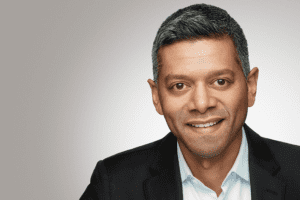Many companies use artificial intelligence and machine learning to deliver services in consumer fintech. Still, TIFIN uses those tools to drive the personalization of wealth management, founder and CEO Vinay Nair said.
Formerly a finance professor at the Wharton School, Nair founded 55ip, a tax-smart investment strategy engine. He sold the company to J.P. Morgan in December 2020 and remains a special advisor to the CEO of J.P. Morgan’s asset management business.

TIFIN focuses on making the wealth generation experience more engaging for the individual, whether the professional financial advisor or independent investor. The key, Nair explained, is through focusing on personalization opportunities.
Some companies develop a handful of streams and slap the personalized label on their technology, but it is not so simple, Nair said. Engage the individual, build a set of personalization capabilities and deliver it through front-end software and APIs. Think Netflix or Spotify but with more responsibility for better outcomes.
TIFIN Wealth helps financial advisors deliver personalized services
There are three components within TIFIN. The first, TIFIN Wealth, serves financial advisors and wealth enterprises. They provide planning capabilities and risk and personality assessments that help professionals better understand their clients. Through an algorithm, content can be provided that fits a client’s needs. Its success is quantified through an engagement score.
A personalized giving element allows clients to set up a donor-advised fund that coordinates the family’s donations. TIFIN also recently developed the capability to build customized allocations to alternatives such as hedge funds and private equity funds.
Magnifi: Think Google for personalization of investment criteria
Magnifi is an investment marketplace that allows investors to research investments meeting specific criteria such as ones from particular countries (or excluding some) or those that perform well as inflation rises. Investors can even search for companies that meet ESG standards.
The ultimate vision is to deliver a comprehensive investment experience. Approximately 1,600 advisors and 50,000 individuals use Magnifi’s free and premium versions.
“There is nothing out there where people can hang out like a marketplace,” Nair said. “Our goal was to build an investment marketplace from discovery to research to action.
“We have no incentives to get someone to trade. We make no money directly or indirectly from any sort of trading there. So Magnifi is the world’s first investment marketplace, powered by natural language to simplify finance and distribute intelligence. We have an AI conversational assistant for people who use Magnifi.”
Financial Answers and the bounty of the data lake
The third component is Financial Answers, a data acquisition platform with three million subscribers to newsletters and financial media sites. Financial Answers is also getting its data through the acquisition of select companies.
Together the three entities feed data into a central data lake, Nair explained. What do people read? What articles do they click on? What assessments have they completed?
“That data lake is what drives the personalization for the user because you cannot personalize without data,” Nair said. “At the end of the day, TIFIN is what I think will become the largest first-party data in wealth and investments. That is being used to drive personalization. And it’s being done in a way that gets the end individual to a better state through engagement and results.”
New technology, but this time for personalization on the front end
TIFIN is addressing a sector where most improvements have targeted back-end operations, Nair said. Companies focused their efforts on automating tasks which helped the advisors but not their clients. Conversely, TIFIN focuses on the end client and how advisors can extend value propositions to them. They have incorporated components from other companies for the back and middle offices, but their focus is on the front.
This is a strong example of technology completing tasks that allow financial advisors to provide higher-value services.
“We are trying to be that engine for all the intermediaries who are delivering value to the end client,” Nair said. “There are some low-touch versions of that, for example, in Magnifi. That’s in there for people who were not working with intermediaries.”
Social trends are Priority One for young investors
The search capability comes at the perfect time, just as younger generations of investors pay close attention to the ethics of the companies they invest in. Nair said some of their most popular search queries are for causes like Black Lives Matter and gender equality. It’s a perfect opportunity for advisors to help clients make socially-conscious choices.
In a similar vein, Nair said there had been a significant impact from TIFIN’s personalized giving technology. Advisors can create donor-advised funds which engage the entire family. That fosters regular contact.
“All family members are engaging with that giving exercise, and through that, they get to know their advisor, which otherwise would generally never happen,” Nair said. “And it’s a very organic, authentic way for them to form a relationship without them trying to sell to the kids or the grandkids of the client. Some of these social trends that are more prevalent among the younger generations provide ways to personalize and connect with them.”
The future of wealth tech
Nair believes wealth will be part of every fintech offering in the not-so-distant future, just like many have lending today. That will lead to incumbents buying fintechs as J.P. Morgan did with 55ip. Look to payments, where fintechs buy each other, some even buying incumbents.
“Just like your banks, you have neobanks. You have insurers; you have neoinsurers. In wealth too, you will find just the neo versions of TAMPS and wealth platforms that have been created in the past,” Nair concluded.
“Asset managers are working pretty closely to do some of this in-house, some externally. So the trend that we are quite excited about is how does the ecosystem of the individual to the advisor to the asset manager change because of the very early but fintech disruption that’s going on.”


